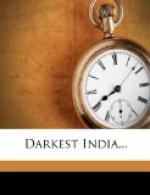Another distinctive feature of the book is the extent to which it combines the shrewdest and most practical business capacity with the most exalted religious enthusiasm. The fanatic is usually regarded as somewhat of a fool; no one can read this book through and think that General Booth has the least deficiency in practical capacity, in shrewd common sense and enormous knowledge of men. From one point of view it is easy to be a saint, and it is easy to be a man of the world; the difficulty is to combine the two qualities, the cunning of the serpent with the innocence of the dove. There is nothing of the naive and guileless innocence of a cloistered virtue in the book, but though the serpent is very cunning his wiliness and craftiness coexist with a simple enthusiasm of humanity which is very marvellous to behold. When we read General Booth’s expressions of confidence in the salvability of mankind and note the intrepid audacity with which he sallies forth like another David to attack the huge Goliath who threatens the hosts of our modern Israel, and remember that he is no mere shepherd boy fresh from the fold, but one who for forty years of his life has lived and laboured in an atmosphere saturated with emanations from every form of human vice and wretchedness, then we feel somewhat as did Moses when he stood before the burning bush, “and he looked, and behold the bush burned with fire and the bush was not consumed.”
THOMAS CARLYLE REDIVIVUS.
It is impossible not to be impressed by the parallel and at the same time by the contrast between General Booth’s book and the latter day prophecies of Mr. Carlyle. For forty years and more Mr. Carlyle prophesied unto the men of his generation, proclaiming in accents of deep earnestness, tinged, however, by a bitter despair, what should be done if we were not utterly to perish. I remember the bitterness with which he told me, while the shadows of the dark valley were gathering round him, that when he wrote his whole soul out in “Latter Day Pamphlets,” and delivered to the public that which he believed to be the very truth and inner secret of all things, his message was flouted, and “it was currently reported,” said he, with grim resentfulness “it was currently reported that I had written them under the influence of too much whiskey.” Now, however, another prophet has arisen with practically the same gospel, but with oh, how different a setting! In Mr. Carlyle’s books, his prophetic message shines out lurid as from the background of thunder-cloud amid the gloom as of an eclipse heralded by portents of ruin and decay. Here “In Darkest England and the Way Out” there is a brightness and a gladness as of a May day sunrise. Infinite hope bubbles up in every page, and in every chapter there is a calm confidence which comes from the experience of one who in sixty years of troubled life can say with full assurance “I know in whom I have believed.”




